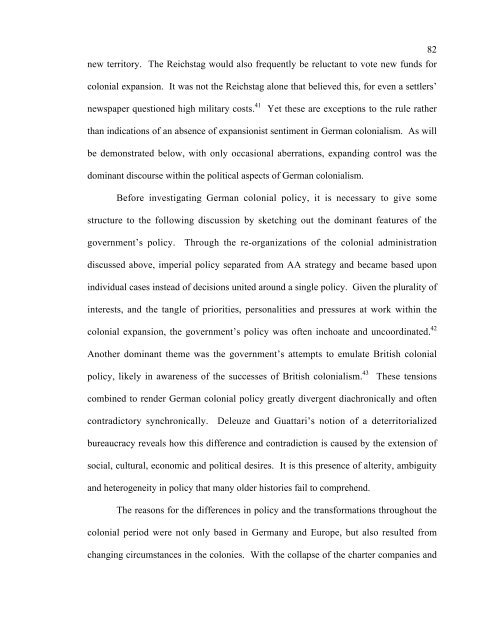A Deterritorialized History: Investigating German Colonialism ...
A Deterritorialized History: Investigating German Colonialism ...
A Deterritorialized History: Investigating German Colonialism ...
You also want an ePaper? Increase the reach of your titles
YUMPU automatically turns print PDFs into web optimized ePapers that Google loves.
new territory. The Reichstag would also frequently be reluctant to vote new funds for<br />
colonial expansion. It was not the Reichstag alone that believed this, for even a settlers’<br />
newspaper questioned high military costs. 41 Yet these are exceptions to the rule rather<br />
than indications of an absence of expansionist sentiment in <strong>German</strong> colonialism. As will<br />
be demonstrated below, with only occasional aberrations, expanding control was the<br />
dominant discourse within the political aspects of <strong>German</strong> colonialism.<br />
Before investigating <strong>German</strong> colonial policy, it is necessary to give some<br />
structure to the following discussion by sketching out the dominant features of the<br />
government’s policy. Through the re-organizations of the colonial administration<br />
discussed above, imperial policy separated from AA strategy and became based upon<br />
individual cases instead of decisions united around a single policy. Given the plurality of<br />
interests, and the tangle of priorities, personalities and pressures at work within the<br />
colonial expansion, the government’s policy was often inchoate and uncoordinated. 42<br />
Another dominant theme was the government’s attempts to emulate British colonial<br />
policy, likely in awareness of the successes of British colonialism. 43 These tensions<br />
combined to render <strong>German</strong> colonial policy greatly divergent diachronically and often<br />
contradictory synchronically. Deleuze and Guattari’s notion of a deterritorialized<br />
bureaucracy reveals how this difference and contradiction is caused by the extension of<br />
social, cultural, economic and political desires. It is this presence of alterity, ambiguity<br />
and heterogeneity in policy that many older histories fail to comprehend.<br />
The reasons for the differences in policy and the transformations throughout the<br />
colonial period were not only based in <strong>German</strong>y and Europe, but also resulted from<br />
changing circumstances in the colonies. With the collapse of the charter companies and<br />
82
















